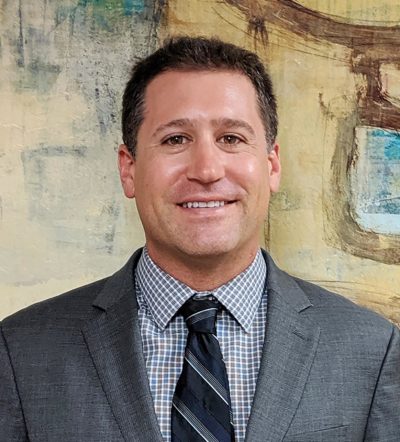
The Practice of Law versus the Business of Law
A Q&A with Opposing Counsel COOs
July 2022
Download This Article (.pdf)
We’re all trying to grow as individuals in the different roles we encompass. This year, I’ve personally put a heavy focus on becoming a better chief operating officer (COO) for my firm, which specializes in personal injury and workers’ compensation cases. Since we opened FWI Legal nearly five years ago, we’ve had solid growth and success, but lately my partners and I have been thinking about how to take the firm to the next level. For me, it’s a shift in perspective that COO is more than a title—it’s a proper job.
That’s when I started looking outside myself to be better. I began with written materials, as well as seminars and videos. But then I realized I have direct access to other leaders in the profession as well. Soon, one name in particular stood out to me—Joe Gren. Joe is the COO for Brown Gren Abraham & McCracken, LLC. He’s also a defense attorney, which might surprise some of you. Maybe you think, “hey wait, don’t opposing counsels, kind of, you know, hate each other?”
It reminds me of professional athletes. They’ll meet on the gridiron, basketball court, boxing ring, or whatever territory marks their match. They want to win badly and will give it their all, but the ones you admire have post-game interviews with phrases like “we faced a great team today” and “we respect the heck out of our opponent.”
That’s what I aim for in an attorney relationship—a mutual understanding that we represent the interests of different parties but we are also human beings and professionals. I know that’s what I’m getting from Joe, and that’s why I asked him if he’d be interested in doing this Q&A about the dualities of COO and attorney. I was thrilled to see he shared my enthusiasm and accepted my invitation. So, without further ado, here are those questions and answers.
How does your role as COO differ from your role as an attorney?
 Joe: The role of the COO and that of an attorney have similarities and vast differences. Both a COO and an attorney owe fiduciary obligations to their respective company and firm clients. Both also require the ability to approach a problem strategically and to adapt to unique challenges. As a COO, my job is to focus primarily on the health and welfare of the business itself. One very important role of the COO is to manage employees but also find better ways to improve the quality of work culture, which in a law firm setting can be difficult at times. Managing attorneys, paralegals, and administrative staff requires a degree of compassion and understanding of each employee’s unique situation. Additionally, as an attorney, our efforts are focused on the best possible outcome for our clients with little to no margin of error. But as a manager, one must accept there will be successes and failures, but dually not be afraid to decide on a given plan knowing the risk of failure.
Joe: The role of the COO and that of an attorney have similarities and vast differences. Both a COO and an attorney owe fiduciary obligations to their respective company and firm clients. Both also require the ability to approach a problem strategically and to adapt to unique challenges. As a COO, my job is to focus primarily on the health and welfare of the business itself. One very important role of the COO is to manage employees but also find better ways to improve the quality of work culture, which in a law firm setting can be difficult at times. Managing attorneys, paralegals, and administrative staff requires a degree of compassion and understanding of each employee’s unique situation. Additionally, as an attorney, our efforts are focused on the best possible outcome for our clients with little to no margin of error. But as a manager, one must accept there will be successes and failures, but dually not be afraid to decide on a given plan knowing the risk of failure.
 Jerrod: The short version is that my job as an attorney is the welfare of my clients and their cases, whereas my job as the COO is the welfare of our employees and the business. In each case, when certain aspects have stalled, I view it as my duty to get the gears moving again. One of the reasons we started FWI Legal is to give clients and employees the attention and long-term happiness they deserve. We of course stumble at times, but in my biased opinion we’re willing to accept mistakes and use them as opportunities to grow. We’re also trying out new, creative ideas to make our cases and the business work in ways that haven’t been done before, and in so doing, have come up with some awesome techniques. The moment a concept becomes reality is truly satisfying.
Jerrod: The short version is that my job as an attorney is the welfare of my clients and their cases, whereas my job as the COO is the welfare of our employees and the business. In each case, when certain aspects have stalled, I view it as my duty to get the gears moving again. One of the reasons we started FWI Legal is to give clients and employees the attention and long-term happiness they deserve. We of course stumble at times, but in my biased opinion we’re willing to accept mistakes and use them as opportunities to grow. We’re also trying out new, creative ideas to make our cases and the business work in ways that haven’t been done before, and in so doing, have come up with some awesome techniques. The moment a concept becomes reality is truly satisfying.
How has becoming a COO changed your interactions with clients, judges, and other attorneys?
Joe: Becoming COO has not necessarily changed my interactions with clients, judges, or peers. As any officer of a company, becoming COO has made me more conscious that my actions are the reflection of the business. What I say or do not say, or my general attitude, can speak volumes for our firm.
Jerrod: It gives you a long-term perspective. When you’re a new legal professional, it’s easy to get into a bad routine of keeping your head down in the trenches and ignoring the people around you. Being COO makes you think about your reputation a bit more. You no longer act on your own behalf; you now help carry the image of an entire organization with you. Employees and peers alike will look at the way you conduct yourself and make assumptions about your firm, whether you like it or not.
What’s your favorite part about being COO?
Joe: The ability to be creative and develop unique solutions to management. The practice of law and the business of law are two entirely different playing fields. There are only a few models used by lawyers to manage law firms with diverse practice groups. I love consistently researching law firm management models and trying to fine-tune our operations to increase client satisfaction. The successful firms evolve over time, whether it’s through technology, staffing alterations, payroll models, or simply use of office space.
My other favorite part of being COO is connecting with our employees. Law firms are busy places, and personal connections are often lost in the daily shuffle of paperwork and court deadlines. I find the time to sit and talk with our employees about the challenges of their jobs and about whatever else is happening in their lives.
Jerrod: I love the opportunity to exercise creativity and organizational skills. There is no single, correct way to run a business, which means you get to help create the culture and policies that shape your brand. I studied marketing as an undergrad, so it’s exciting to use those skills in my career. I also love learning new strategies and sharing them with others, and being COO certainly gives me that platform.
What’s been one of the biggest business challenges you’ve overcome, and how did you do it?
Joe: I had to learn that tackling business challenges is done through long-term strategies with “baby step” short-term goals. Approaching a business challenge is very different than just trying to solve a problem with immediate solutions. I had to accept that my goals need to have flexible deadlines, similar to a construction project where it’s inevitable you will need 20% more resources and months longer than anticipated.
Jerrod: Many people are skilled employees or have a talent they want to turn into a career. That doesn’t mean they know how to run a business. I have always had an interest in helping lead an organization and have taken classes and read books on the subject, but desire alone is not enough. You don’t get your business’s “P.C.” distinction from the state and suddenly have the skill set required to thrive. You’ve got to actively work really hard at it and self-evaluate.
It also takes a variety of attributes to run a smooth operation; you might be good with numbers but bad at training people with different personalities. If you let pride stand in the way, you won’t learn, and your organization will stall. I lean toward a type A personality with an attitude of “no time like the present.” So a big challenge has been big-picture pacing, accepting what I don’t know, and being willing and humble enough to seek out other people and resources to make the firm better.
Knowing what you know now, what’s some advice you’d give legal professionals just starting out?
Joe: Approach the practice of law like an attorney and approach the law practice as a business. What management model works for a tort defense firm may not work for an estates practice. Do not assume that your law degree makes you competent in other areas of business. Be willing to take the time to learn what works and what does not work for your practice area. And most important, treat your staff and colleagues as professionals and provide them with the same level of respect and courtesy you would extend to a judge or your parents. Try to exercise patience with errors made by others and approach each failure as a learning lesson.
Jerrod: I picture my younger self as a law student and as a new attorney, who at many times struggled with understanding where I fit in and if I had made a huge mistake. We have to make a career choice at some point, and in the process, you can feel like you forfeited other interests and got locked into the rest of your life. I’d want to tell younger me and people who feel similarly situated that there’s an incredible opportunity for individuality in any career. Work hard to learn the position as it has historically been, and then use your unique talents to break the mold. Don’t let bad management discourage you from sharing ideas or continuing self-improvement. Eventually, the right organization and people will recognize and respect your efforts and individuality.


